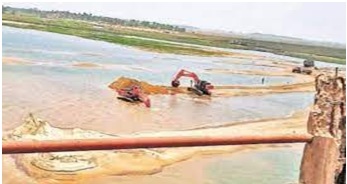There has been a deficit of sand as raw materials used for construction and manufacturing. The UN estimates that 4.1 billion tons of cement is produced every year, driven primarily by China, which constitutes 58% of today’s sand-fueled construction boom.The global use of sand and gravels has been found to be 10 times higher than that of cement. This means that, for construction alone, the world consumes roughly 40 to 50 billion tons of sand on an annual basis.
Sand can be found on almost every country on Earth, blanketing deserts and lining coastlines around the world. But that is not to say that all sand is useful. Desert sand grains, eroded by the wind rather than water, are too smooth and rounded to bind together for construction purposes.Moving forward we are dependent on sand that is usually dredged from rivers. Up to 25% of such sand is mixed in the concrete. In the construction industry alone, which is on a continuous rise, around 40 billion-50 billion tonnes of sand is used every year on a global basis. But since it harms the environment hugely, a number of countries, including India, Cambodia and Vietnam, have banned it in recent years.
A lecturer at Cambridge University has come up with one possible way to solve this shortage of building material is by crushing plastic waste into the sand in concrete mixing.
The lecturer Dr John Orr, a lecturer at Cambridge University and his group of researchers have claimed to find the answer to this sand crisis. According to him, one possible way to solve this shortage of building material is by crushing plastic waste into the sand in concrete mixing. The plastic waste can be sorted, cleaned, shredded and crashed into a sand alternative. Hir research claims that up to 10% of sand in concrete mix can be replaced with plastic waste. It will have the same amount of ‘strength’ and ‘longevity’. This method is not only more cost-effective but also environmentally-friendly. If this alternative is used to make concrete in India, it could save nearly 820 million tonnes of sand every year, said Orr.
The shortfall of sand in India has given rise to illegal sand mining that is controlled by criminal gangs. The sand mafia have also been linked to several murders of people who try to highlight their illegal work.If Orr’s findings are put to practical use, it could also bring down such illegal works in the country. At the same time, researchers are also studying the possibility of replacing sand with other waste materials like shredded old car tyres or ground down glass.

